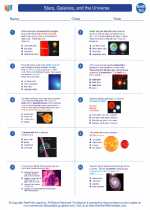Isotopes
Isotopes are atoms of the same element that have the same number of protons but different numbers of neutrons. This means that isotopes of an element have the same atomic number but different mass numbers.
For example, carbon has three naturally occurring isotopes: carbon-12, carbon-13, and carbon-14. They all have 6 protons, but they have 6, 7, and 8 neutrons respectively.
Key Points to Remember:
- Isotopes have the same number of protons but different numbers of neutrons.
- Isotopes of an element have the same atomic number but different mass numbers.
- Isotopes of an element have similar chemical properties but may have different physical properties.
Study Guide:
When studying isotopes, it's important to understand the following concepts:
- What are isotopes?
- How are isotopes represented?
- What are the properties of isotopes?
- What are the applications of isotopes in various fields such as medicine, industry, and environmental science?
Additionally, it's important to be able to calculate the average atomic mass of an element using the relative abundance of its isotopes.
Understanding isotopes is crucial in many scientific fields, including chemistry, physics, and environmental science, so it's important to grasp the fundamental concepts and applications of isotopes.
[Isotopes] Related Worksheets and Study Guides:
.◂Earth Science Worksheets and Study Guides High School. Stars, Galaxies, and the Universe

 Worksheet/Answer key
Worksheet/Answer key
 Worksheet/Answer key
Worksheet/Answer key
 Worksheet/Answer key
Worksheet/Answer key
